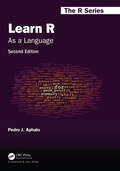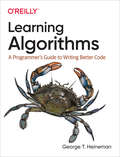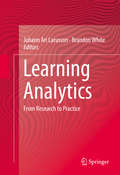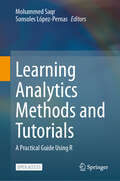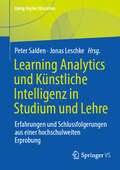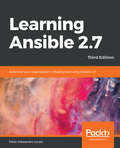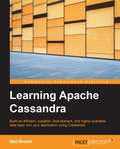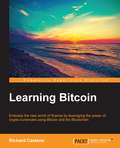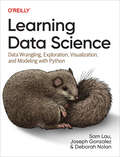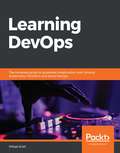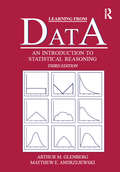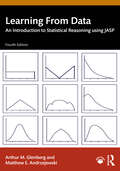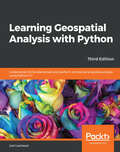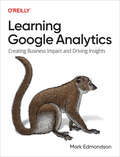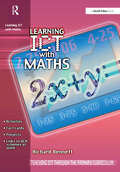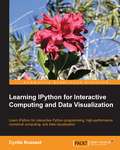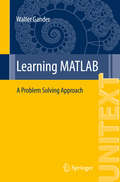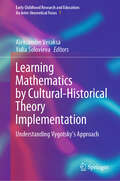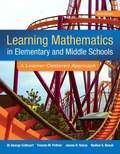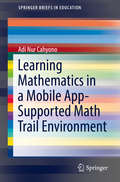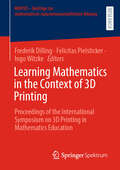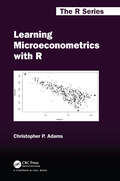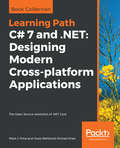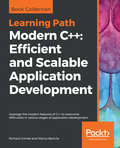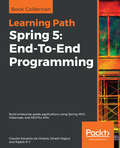- Table View
- List View
Learn R: As a Language (Chapman & Hall/CRC The R Series)
by Pedro J. AphaloLearning a computer language like R can be either frustrating, fun or boring. Having fun requires challenges that wake up the learner’s curiosity but also provide an emotional reward for overcoming them. The book is designed so that it includes smaller and bigger challenges, in what I call playgrounds, in the hope that all readers will enjoy their path to R fluency. Fluency in the use of a language is a skill that is acquired through practice and exploration. For students and professionals in the biological sciences, humanities and many applied fields, recognizing the parallels between R and natural languages should help them feel at home with R. The approach I use is similar to that of a travel guide, encouraging exploration and describing the available alternatives and how to reach them. The intention is to guide the reader through the R landscape of 2024 and beyond.What is new in the second edition? Text expanded by more than 25% to include additional R features and gentler and more detailed explanations Contains 24 new diagrams and flowcharts, seven new tables, and revised text and code examples for clarity All three indexes were expanded, and answers to 28 frequently asked questions added What will you find in this book? Programming concepts explained as they apply to current R Emphasis on the role of abstractions in programming Few prescriptive rules—mostly the author’s preferences together with alternatives Presentation of the R language emphasizing the “R way of doing things” Tutoring for “programming in the small” using scripts for data analysis Explanation of the differences between R proper and extensions for data wrangling The grammar of graphics is described as a language for the construction of data visualisations Examples of data exchange between R and the foreign world using common file formats Coaching to become an independent R user, capable of writing original scripts and solving future challenges
Learning Algorithms: A Programmer's Guide to Writing Better Code
by George HeinemanWhen it comes to writing efficient code, every software professional needs to have an effective working knowledge of algorithms. In this practical book, author George Heineman (Algorithms in a Nutshell) provides concise and informative descriptions of key algorithms that improve coding. Software developers, testers, and maintainers will discover how algorithms solve computational problems creatively.Each chapter builds on earlier chapters through eye-catching visuals and a steady rollout of essential concepts, including an algorithm analysis to classify the performance of every algorithm presented in the book. At the end of each chapter, you'll get to apply what you've learned to a novel challenge problem -- simulating the experience you might find in a technical code interview.With this book, you will:Examine fundamental algorithms central to computer science and software engineeringLearn common strategies for efficient problem solving -- such as divide and conquer, dynamic programming, and greedy approachesAnalyze code to evaluate time complexity using big O notationUse existing Python libraries and data structures to solve problems using algorithmsUnderstand the main steps of important algorithms
Learning Analytics
by Johann Ari Larusson Brandon WhiteIn education today, technology alone doesn't always lead to immediate success for students or institutions. In order to gauge the efficacy of educational technology, we need ways to measure the efficacy of educational practices in their own right. Through a better understanding of how learning takes place, we may work toward establishing best practices for students, educators, and institutions. These goals can be accomplished with learning analytics. Learning Analytics: From Research to Practice updates this emerging field with the latest in theories, findings, strategies, and tools from across education and technological disciplines. Guiding readers through preparation, design, and examples of implementation, this pioneering reference clarifies LA methods as not mere data collection but sophisticated, systems-based analysis with practical applicability inside the classroom and in the larger world. Case studies illustrate applications of LA throughout academic settings (e. g. , intervention, advisement, technology design), and their resulting impact on pedagogy and learning. The goal is to bring greater efficiency and deeper engagement to individual students, learning communities, and educators, as chapters show diverse uses of learning analytics to: Enhance student and faculty performance. Improve student understanding of course material. Assess and attend to the needs of struggling learners. Improve accuracy in grading. Allow instructors to assess and develop their own strengths. Encourage more efficient use of resources at the institutional level. Researchers and practitioners in educational technology, IT, and the learning sciences will hail the information in Learning Analytics: From Research to Practice as a springboard to new levels of student, instructor, and institutional success.
Learning Analytics Methods and Tutorials: A Practical Guide Using R
by Sonsoles López-Pernas Mohammed SaqrThis open access comprehensive methodological book offers a much-needed answer to the lack of resources and methodological guidance in learning analytics, which has been a problem ever since the field started. The book covers all important quantitative topics in education at large as well as the latest in learning analytics and education data mining. The book also goes deeper into advanced methods that are at the forefront of novel methodological innovations. Authors of the book include world-renowned learning analytics researchers, R package developers, and methodological experts from diverse fields offering an unprecedented interdisciplinary reference on novel topics that is hard to find elsewhere.The book starts with the basics of R as a programming language, the basics of data cleaning, data manipulation, statistics, and analytics. In doing so, the book is suitable for newcomers as they can find an easy entry to the field, as well as being comprehensive of all the major methodologies. For every method, the corresponding chapter starts with the basics, explains the main concepts, and reviews examples from the literature. Every chapter has a detailed explanation of the essential techniques and basic functions combined with code and a full tutorial of the analysis with open-access real-life data. A total of 22 chapters are included in the book covering a wide range of methods such as predictive learning analytics, network analysis, temporal networks, epistemic networks, sequence analysis, process mining, factor analysis, structural topic modeling, clustering, longitudinal analysis, and Markov models. What is really unique about the book is that researchers can perform the most advanced analysis with the included code using the step-by-step tutorial and the included data without the need for any extra resources.This is an open access book.
Learning Analytics und Künstliche Intelligenz in Studium und Lehre: Erfahrungen und Schlussfolgerungen aus einer hochschulweiten Erprobung (Doing Higher Education)
by Peter Salden Jonas LeschkeIn dem Sammelband werden die Ergebnisse aus dem Projekt „KI:edu.nrw - Didaktik, Ethik und Technik von Learning Analytics und KI in der Hochschulbildung“ im Zeitraum 2020-2023 vorgestellt. Ziel des Projekts war es, sowohl an der im Schwerpunkt geförderten Ruhr-Universität Bochum als auch an der partnerschaftlich verbundenen RWTH Aachen exemplarisch zu erarbeiten, wie Regeln, Konzepte, Prozesse und Technik für den Einsatz von Learning Analytics und KI in Studium und Lehre ausgestaltet werden können. Die Besonderheit: Alle lehrbezogenen Akteurinnen und Akteure wurden in einem umfassenden Ansatz einbezogen, um zu verstehen, wie Hochschulen sich als Gesamtorganisationen auf die kommenden Herausforderungen in diesem Bereich einstellen müssen. Der Band zeigt damit Wege in eine zukünftige Hochschulwelt, die nicht mehr in allzu weiter Ferne liegt.
Learning Ansible 2.7: Automate your organization's infrastructure using Ansible 2.7, 3rd Edition
by Fabio Alessandro LocatiUse Ansible to configure your systems, deploy software, and orchestrate advanced IT tasksKey FeaturesGet familiar with the fundamentals of Ansible 2.7Understand how to use Ansible Tower to scale your IT automationGain insights into how to develop and test Ansible playbooks Book DescriptionAnsible is an open source automation platform that assists organizations with tasks such as application deployment, orchestration, and task automation. With the release of Ansible 2.7, even complex tasks can be handled much more easily than before.Learning Ansible 2.7 will help you take your first steps toward understanding the fundamentals and practical aspects of Ansible by introducing you to topics such as playbooks, modules, and the installation of Linux, Berkeley Software Distribution (BSD), and Windows support. In addition to this, you will focus on various testing strategies, deployment, and orchestration to build on your knowledge. The book will then help you get accustomed to features including cleaner architecture, task blocks, and playbook parsing, which can help you to streamline automation processes. Next, you will learn how to integrate Ansible with cloud platforms such as Amazon Web Services (AWS) before gaining insights into the enterprise versions of Ansible, Ansible Tower and Ansible Galaxy. This will help you to use Ansible to interact with different operating systems and improve your working efficiency. By the end of this book, you will be equipped with the Ansible skills you need to automate complex tasks for your organization.What you will learnCreate a web server using Ansible Write a custom module and test it Deploy playbooks in the production environment Troubleshoot networks using Ansible Use Ansible Galaxy and Ansible Tower during deployment Deploy an application with Ansible on AWS, Azure and DigitalOceanWho this book is forThis beginner-level book is for system administrators who want to automate their organization's infrastructure using Ansible 2.7. No prior knowledge of Ansible is required
Learning Apache Cassandra
by Mat BrownIf you're an application developer familiar with SQL databases such as MySQL or Postgres, and you want to explore distributed databases such as Cassandra, this is the perfect guide for you. Even if you've never worked with a distributed database before, Cassandra's intuitive programming interface coupled with the step-by-step examples in this book will have you building highly scalable persistence layers for your applications in no time.
Learning Bitcoin
by Richard CaetanoEmbrace the new world of fiance by leveraging the power of crypto-currencies using Bitcoin and the BlockchainAbout This BookSet up your own wallet, buy and sell Bitcoin, and execute custom transactions on the BlockchainLeverage the power of Bitcoin to reduce transaction costs and eliminate fraudA practical step-by-step guide to break down the Bitcoin technology to ensure safe transactionsWho This Book Is ForIf you are familiar with online banking and want to expand your finances into a resilient and transparent currency, this book is ideal for you. A basic understanding of online wallets and financial systems will be highly beneficial to unravel the mysteries of Bitcoin.What You Will LearnSet up your wallet and buy a Bitcoin in a flash while understanding the basics of addresses and transactionsAcquire the knack of buying, selling, and trading Bitcoins with online marketplacesSecure and protect your Bitcoins from online theft using Brainwallets and cold storageUnderstand how Bitcoin's underlying technology, the Blockchain, works with simple illustrations and explanationsConfigure your own Bitcoin node and execute common operations on the networkDiscover various aspects of mining Bitcoin and how to set up your own mining rigDive deeper into Bitcoin and write scripts and multi-signature transactions on the networkExplore the various alt-coins and get to know how to compare them and their valueIn DetailThe financial crisis of 2008 raised attention to the need for transparency and accountability in the financial world. As banks and governments were scrambling to stay solvent while seeking a sustainable plan, a powerfully new and resilient technology emerged.Bitcoin, built on a fundamentally new technology called "The Blockchain," offered the promise of a new financial system where transactions are sent directly between two parties without the need for central control.Bitcoin exists as an open and transparent financial system without banks, governments, or corporate support. Simply put, Bitcoin is "programmable money" that has the potential to change the world on the same scale as the Internet itself.This book arms you with immense knowledge of Bitcoin and helps you implement the technology in your money matters, enabling secure transactions.We first walk through the fundamentals of Bitcoin, illustrate how the technology works, and exemplify how to interact with this powerful and new financial technology. You will learn how to set up your online Bitcoin wallet, indulge in buying and selling of bitcoins, and manage their storage. We then get to grips with the most powerful algorithm of all times: the Blockchain, and learn how crypto-currencies can reduce the risk of fraud for e-commerce merchants and consumers.With a solid base of Blockchain, you will write and execute your own custom transactions. Most importantly, you will be able to protect and secure your Bitcoin with the help of effective solutions provided in the book. Packed with plenty of screenshots, Learning Bitcoin is a simple and painless guide to working with Bitcoin.Style and approachThis is an easy-to-follow guide to working with Bitcoin and the Blockchain technology. This book is ideal for anyone who wants to learn the basics of Bitcoin and explore how to set up their own transactions.
Learning Data Science: Data Wrangling, Exploration, Visualization, and Modeling with Python
by Deborah Nolan Sam Lau Joseph GonzalezAs an aspiring data scientist, you appreciate why organizations rely on data for important decisions--whether it's for companies designing websites, cities deciding how to improve services, or scientists discovering how to stop the spread of disease. And you want the skills required to distill a messy pile of data into actionable insights. We call this the data science lifecycle: the process of collecting, wrangling, analyzing, and drawing conclusions from data.Learning Data Science is the first book to cover foundational skills in both programming and statistics that encompass this entire lifecycle. It's aimed at those who wish to become data scientists or who already work with data scientists, and at data analysts who wish to cross the "technical/nontechnical" divide. If you have a basic knowledge of Python programming, you'll learn how to work with data using industry-standard tools like pandas.Refine a question of interest to one that can be studied with dataPursue data collection that may involve text processing, web scraping, etc.Glean valuable insights about data through data cleaning, exploration, and visualizationLearn how to use modeling to describe the dataGeneralize findings beyond the data
Learning DevOps: The complete guide to accelerate collaboration with Jenkins, Kubernetes, Terraform and Azure DevOps
by Mikael KriefSimplify your DevOps roles with DevOps tools and techniques Key Features Learn to utilize business resources effectively to increase productivity and collaboration Leverage the ultimate open source DevOps tools to achieve continuous integration and continuous delivery (CI/CD) Ensure faster time-to-market by reducing overall lead time and deployment downtime Book Description The implementation of DevOps processes requires the efficient use of various tools, and the choice of these tools is crucial for the sustainability of projects and collaboration between development (Dev) and operations (Ops). This book presents the different patterns and tools that you can use to provision and configure an infrastructure in the cloud. You'll begin by understanding DevOps culture, the application of DevOps in cloud infrastructure, provisioning with Terraform, configuration with Ansible, and image building with Packer. You'll then be taken through source code versioning with Git and the construction of a DevOps CI/CD pipeline using Jenkins, GitLab CI, and Azure Pipelines. This DevOps handbook will also guide you in containerizing and deploying your applications with Docker and Kubernetes. You'll learn how to reduce deployment downtime with blue-green deployment and the feature flags technique, and study DevOps practices for open source projects. Finally, you'll grasp some best practices for reducing the overall application lead time to ensure faster time to market. By the end of this book, you'll have built a solid foundation in DevOps, and developed the skills necessary to enhance a traditional software delivery process using modern software delivery tools and techniques What you will learn Become well versed with DevOps culture and its practices Use Terraform and Packer for cloud infrastructure provisioning Implement Ansible for infrastructure configuration Use basic Git commands and understand the Git flow process Build a DevOps pipeline with Jenkins, Azure Pipelines, and GitLab CI Containerize your applications with Docker and Kubernetes Check application quality with SonarQube and Postman Protect DevOps processes and applications using DevSecOps tools Who this book is for If you are a developer or a system administrator interested in understanding continuous integration, continuous delivery, and containerization with DevOps tools and techniques, this book is for you.
Learning From Data: An Introduction To Statistical Reasoning
by Arthur Glenberg Matthew AndrzejewskiLearning from Data focuses on how to interpret psychological data and statistical results. The authors review the basics of statistical reasoning to helpstudents better understand relevant data that affecttheir everyday lives. Numerous examples based on current research and events are featured throughout.To facilitate learning, authors Glenberg and Andrzejewski: Devote extra attention to explaining the more difficult concepts and the logic behind them Use repetition to enhance students’ memories with multiple examples, reintroductions of the major concepts, and a focus on these concepts in the problems Employ a six-step procedure for describing all statistical tests from the simplest to the most complex Provide end-of-chapter tables to summarize the hypothesis testing procedures introduced Emphasizes how to choose the best procedure in the examples, problems and endpapers Focus on power with a separate chapter and power analyses procedures in each chapter Provide detailed explanations of factorial designs, interactions, and ANOVA to help students understand the statistics used in professional journal articles. The third edition has a user-friendly approach: Designed to be used seamlessly with Excel, all of the in-text analyses are conducted in Excel, while the book’s CD contains files for conducting analyses in Excel, as well as text files that can be analyzed in SPSS, SAS, and Systat Two large, real data sets integrated throughout illustrate important concepts Many new end-of-chapter problems (definitions, computational, and reasoning) and many more on the companion CD Online Instructor’s Resources includes answers to all the exercises in the book and multiple-choice test questions with answers Boxed media reports illustrate key concepts and their relevance to realworld issues The inclusion of effect size in all discussions of power accurately reflects the contemporary issues of power, effect size, and significance. Learning From Data, Third Edition is intended as a text for undergraduate or beginning graduate statistics courses in psychology, education, and other applied social and health sciences.
Learning From Data: An Introduction to Statistical Reasoning using JASP
by Arthur M. Glenberg Matthew E. AndrzejewskiThis fully updated fourth edition explores the foundations of statistical reasoning, focusing on how to interpret psychological data and statistical results. This edition includes three important new features. First, the book is closely integrated with the free statistical analysis program JASP. Thus, students learn how to use JASP to help with tasks such as constructing grouped frequency distributions, making violin plots, conducting inferential statistical tests, and creating confidence intervals. Second, reflecting the growing use of Bayesian analyses in the professional literature, this edition includes a chapter with an introduction to Bayesian statistics (also using JASP). Third, the revised text incorporates adjunct questions, that is, questions that challenge the student’s understanding, after each major section. Cognitive psychology has demonstrated how adjunct questions and related techniques such as self-explanation can greatly improve comprehension.Additional key features of the book include:• A user-friendly approach, with focused attention to explaining the more difficult concepts and the logic behind them. End of chapter tables summarize the hypothesis testing procedures introduced, and exercises support information recall and application.• The consistent use of a six-step procedure for all hypothesis tests that captures the logic of statistical inference.• Multiple examples of each of the major inferential statistical tests.• Boxed media reports illustrate key concepts and their relevance to real-world issues.• A focus on power, with a separate chapter, and power analysis procedures in each chapter.With comprehensive digital resources, including large data sets integrated throughout the textbook, and files for conducting analysis in JASP, this is an essential text for undergraduate or beginning graduate statistics courses in psychology, education, and other applied social and health sciences.
Learning Geospatial Analysis with Python: Understand GIS fundamentals and perform remote sensing data analysis using Python 3.7, 3rd Edition
by Joel LawheadLearn the core concepts of geospatial data analysis for building actionable and insightful GIS applications Key Features Create GIS solutions using the new features introduced in Python 3.7 Explore a range of GIS tools and libraries such as PostGIS, QGIS, and PROJ Learn to automate geospatial analysis workflows using Python and Jupyter Book Description Geospatial analysis is used in almost every domain you can think of, including defense, farming, and even medicine. With this systematic guide, you'll get started with geographic information system (GIS) and remote sensing analysis using the latest features in Python. This book will take you through GIS techniques, geodatabases, geospatial raster data, and much more using the latest built-in tools and libraries in Python 3.7. You'll learn everything you need to know about using software packages or APIs and generic algorithms that can be used for different situations. Furthermore, you'll learn how to apply simple Python GIS geospatial processes to a variety of problems, and work with remote sensing data. By the end of the book, you'll be able to build a generic corporate system, which can be implemented in any organization to manage customer support requests and field support personnel. What you will learn Automate geospatial analysis workflows using Python Code the simplest possible GIS in just 60 lines of Python Create thematic maps with Python tools such as PyShp, OGR, and the Python Imaging Library Understand the different formats that geospatial data comes in Produce elevation contours using Python tools Create flood inundation models Apply geospatial analysis to real-time data tracking and storm chasing Who this book is for This book is for Python developers, researchers, or analysts who want to perform geospatial modeling and GIS analysis with Python. Basic knowledge of digital mapping and analysis using Python or other scripting languages will be helpful.
Learning Google Analytics: Creating Business Impact and Driving Insights
by Mark EdmondsonWhy is Google Analytics 4 the most modern data model available for digital marketing analytics? Because rather than simply report what has happened, GA4's new cloud integrations enable more data activation—linking online and offline data across all your streams to provide end-to-end marketing data. This practical book prepares you for the future of digital marketing by demonstrating how GA4 supports these additional cloud integrations.Author Mark Edmondson, Google Developer Expert for Google Analytics and Google Cloud, provides a concise yet comprehensive overview of GA4 and its cloud integrations. Data, business, and marketing analysts will learn major facets of GA4's powerful new analytics model, with topics including data architecture and strategy, and data ingestion, storage, and modeling. You'll explore common data activation use cases and get guidance on how to implement them.You'll learn:How Google Cloud integrates with GA4The potential use cases that GA4 integrations can enableSkills and resources needed to create GA4 integrationsHow much GA4 data capture is necessary to enable use casesThe process of designing dataflows from strategy though data storage, modeling, and activation
Learning ICT with Maths (Teaching ICT through the Primary Curriculum)
by Richard BennettProviding practical guidance on enhancing learning through ICT in maths, this book is made up of a series of projects that supplement, augment and extend the QCA ICT scheme and provide much-needed links with Units in other subjects’ schemes of work. It includes: fact cards that support each project and clearly outline its benefits in relation to teaching and learning examples of how activities work in 'real' classrooms links to research, inspection evidence and background reading to support each project adaptable planning examples and practical ideas provided on an accompanying CD ROM. Suitable for all trainee and practising primary teachers.
Learning IPython for Interactive Computing and Data Visualization
by Cyrille RossantA practical hands-on guide which focuses on interactive programming, numerical computing, and data analysis with IPython.This book is for Python developers who use Python as a scripting language or for software development, and are interested in learning IPython for increasing their productivity during interactive sessions in the console. Knowledge of Python is required, whereas no knowledge of IPython is necessary.
Learning MATLAB
by Walter GanderThis comprehensive and stimulating introduction to Matlab, a computer language now widely used for technical computing, is based on an introductory course held at Qian Weichang College, Shanghai University, in the fall of 2014. Teaching and learning a substantial programming language aren't always straightforward tasks. Accordingly, this textbook is not meant to cover the whole range of this high-performance technical programming environment, but to motivate first- and second-year undergraduate students in mathematics and computer science to learn Matlab by studying representative problems, developing algorithms and programming them in Matlab. While several topics are taken from the field of scientific computing, the main emphasis is on programming. A wealth of examples are completely discussed and solved, allowing students to learn Matlab by doing: by solving problems, comparing approaches and assessing the proposed solutions.
Learning Mathematics by Cultural-Historical Theory Implementation: Understanding Vygotsky’s Approach (Early Childhood Research and Education: An Inter-theoretical Focus #7)
by Aleksander Veraksa Yulia SolovievaThis book is devoted to the topic of mathematical skills development, which was the focus of Vygotsky's cultural-historical theory. It offers descriptions of studies of development of visual modelling in children and its use for educational purposes. Special attention is given to concrete examples of Vygotsky’s work and educational programs that makes it possible to replicate the results in various settings. The work also addresses conditions, means and predictors of mathematical concepts acquisition at different ages and educational levels (preschool, primary and middle secondary education). The book shows theoretical solidity of cultural-historical approach and experience of its implementation in teaching of mathematical knowledge in childhood and the study of the process of psychological development.
Learning Mathematics in Elementary and Middle School: A Learner-Centered Approach
by George S. Cathcart Yvonne M. Pothier James H. Vance Nadine S. BezukThis popular text promotes a learner-centered approach to teaching elementary and middle school mathematics. It provides valuable research-based instructional strategies, resources, and activities to help teachers evaluate how children think mathematically and how to link that knowledge to developmentally appropriate teaching practice. With its strong focus on Common Core Standards and analyzing children’s work to meet the individual needs of students, the book helps ensure that all students and teachers can be successful with math. The new edition features integration of the Common Core State Standards throughout, new examples of children’s work, updated internet links, expanded videos of children and classrooms, expanded “In Practice” features, and updated research on mathematics teaching and learning.
Learning Mathematics in a Mobile App-Supported Math Trail Environment (SpringerBriefs in Education)
by Adi Nur CahyonoThis brief presents the results of a study on the development of the mobile app-supported math trail program for learning mathematics. This study is a part of the MathCityMap-Project, a project of the MATIS I Team from IDMI Goethe-Universität Frankfurt, Germany, that comprises math trails around the city that are supported by the use of GPS-enabled mobile phone technology. The project offers an activity that is designed to support students in constructing their own mathematical knowledge by solving the prepared mathematical tasks on the math trail and interacting with the environment, including the digital environment. The brief focuses specifically on the development of a model for a mobile app-supported math trail programme and the implementation of this programme in Indonesia. It offers both an empirical exploration of its implementation as well as critical assessment of students’ motivation in mathematics, their own performance, as well as teachers’ mathematics beliefs. It concludes with a future-forward perspective by recommending strategies for implementation in schools, among the general public of the existing math trails (including its supporting tool). It also discusses strategies for developing and designing new trails and suggests further research in other geographical regions and contexts for continued project development and implementation. Learning Mathematics in a Mobile App-Supported Math Trail Environment articulates an innovative and exciting future for integrating real mathematical tasks and geographic and digital environment into effective mathematics education.
Learning Mathematics in the Context of 3D Printing: Proceedings of the International Symposium on 3D Printing in Mathematics Education (MINTUS – Beiträge zur mathematisch-naturwissenschaftlichen Bildung)
by Frederik Dilling Felicitas Pielsticker Ingo WitzkeThe volume presents a collection of articles on the use of 3D printing technology in mathematics education and in mathematics teacher training. It contains both basic research-oriented contributions as well as reflected descriptions of concrete developments for teaching. The authors of this compilation share a positive attitude towards the possibilities that the use of 3D printing technology (understood as an interplay of software and hardware) can unfold for mathematics education, but critically evaluate from a mathematics education research perspective when, where and how an application can enable an added value for the learning of a mathematical content.
Learning Microeconometrics with R (Chapman & Hall/CRC The R Series)
by Christopher P. AdamsThis book provides an introduction to the field of microeconometrics through the use of R. The focus is on applying current learning from the field to real world problems. It uses R to both teach the concepts of the field and show the reader how the techniques can be used. It is aimed at the general reader with the equivalent of a bachelor’s degree in economics, statistics or some more technical field. It covers the standard tools of microeconometrics, OLS, instrumental variables, Heckman selection and difference in difference. In addition, it introduces bounds, factor models, mixture models and empirical Bayesian analysis. Key Features: Focuses on the assumptions underlying the algorithms rather than their statistical properties. Presents cutting-edge analysis of factor models and finite mixture models. Uses a hands-on approach to examine the assumptions made by the models and when the models fail to estimate accurately. Utilizes interesting real-world data sets that can be used to analyze important microeconomic problems. Introduces R programming concepts throughout the book. Includes appendices that discuss some of the standard statistical concepts and R programming used in the book.
Learning Path - C# 7 and .NET: The Open Source Revolution Of . Net Core
by Mark J. Price Ovais Mehboob KhanThis Learning Path is designed for developers who want to gain a solid foundation with C# and .NET Core, and want to build cross-platform applications. To gain maximum benefits from this Learning Path, you must have the basic knowledge of C#.
Learning Path - Modern C++: Efficient and Scalable Application Development
by Richard Grimes Marius BancilaThis Learning Path is designed for developers who want to gain a solid foundation with C++. A computer, an Internet connection, and the desire to learn how to code in C++ are all you need to get started with this Learning Path.
Learning Path - Spring 5: End to End Programming
by Rajesh R V Dinesh Rajput Claudio Eduardo OliveiraIf you're a developer starting out with Spring, then this learning path will help you learn about the new Spring 5.0 framework concepts followed by their implementation in Java and Kotlin. If you are an experienced Spring developer, then this Learning Path will enable you to gain insights into the new features added in Spring 5.0.
